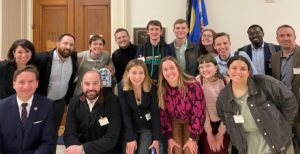As part of his sociology professorship, Tim Pippert makes it a priority to teach his Augsburg University students out of the classroom and get them experiential learning opportunities. Knowing about the Jewish Community Relations Council’s annual trip to the U.S. Holocaust Memorial Museum, Pippert thought it would be a perfect opportunity for his senior seminar students.
“For us, it provided the opportunity to show how sociology is applicable in lots of different ways,” Pippert said in a post-trip discussion about his group’s experience. “So I asked them to think about this trip and the experience in the museum, as how does their sociological training inform what they witnessed? How did the theories that they’ve read about, how does that play out in the symbolic representation of a horrific tragedy? How do you choose to tell that story? And what are the symbols that are used to tell that story?”
Pippert brought 14 of his students on the April 5 trip, part of the 21 college students that came with as a part of the Minne Fellowship. Minne, which means memory in Norwegian, is a fund at the Minneapolis Jewish Federation that was started by the Minneapolis-residing nephew of a Norwegian ship captain who had family that was Nazi collaborators during World War II. His bequest was to fund a program that educates about the Holocaust and Israel, and it is available to students at colleges with Norwegian heritage.
Pippert and his class prepared for the trip by going through webinars that Susie Greenberg, the JCRC’s assistant director for Holocaust education, hosted. The trip to the museum was Pippert’s first, so it sets him up well for what to expect if there are future trips.

After touring the U.S. Holocaust Memorial Museum, Minnesota Hillel’s group met with Rep. Dean Phillips (D-MN) at his Capitol Hill office. (Courtesy Benjie Kaplan).
“If I get to do this again with students now I have a better assessment of how we can build this in more than the opportunities that Susie offered us,” he said. “It’s overwhelming and there’s such so much information. Hopefully, this is not the only time I’m here because there’s so much here that I know I’m getting, and there’s so much more that I know I miss just because there’s a crowd in front of something.”
Pippert’s group weren’t the only college students represented on the trip. Minnesota Hillel brought a group — also for the first time. Executive director Benjie Kaplan said that there was a tipping point that made being on the trip a priority.
“Two years ago a study came out showing 20% or 25% of college students knew what the Holocaust was,” Kaplan said of the 2020 survey by Echoes & Reflections, a partnership program of the Anti-Defamation League, USC Shoah Foundation, and Yad Vashem. “And that is when we started approaching donors saying, when this trip comes back (after COVID), we need to take people.”
The Hillel contingent consisted of three University of Minnesota regents, had four non-Jewish student leaders who have just returned from a trip to Israel, and four Jewish students.
“Honestly, my hope is that we come back to campus with allies who understand our history a little bit more,” Kaplan said. “And when issues arise for Jewish students on campus, they’re more than willing to stand up by our side instead of just being Jews supporting Jews.”
Honoring Wildeson
At the start of the visit to the museum, JCRC Executive Director Steve Hunegs paid tribute to Dan Wildeson, the director of the St. Cloud State University Center for Holocaust and Genocide Education who is retiring at the end of this school year.
“Dan has been a great champion of Holocaust education and civil rights at St. Cloud State University,” Hunegs said. “He is a tremendous partner of the JCRC and the Jewish community.”
Hunegs said that over the years the JCRC has brought groups to D.C., Wildeson has brought hundreds of students on the trips and brought leading Holocaust scholars to campus for lectures.
“Continuing to work with Dan in his retirement is critical for Holocaust and genocide education in Minnesota,” Hunegs said.





